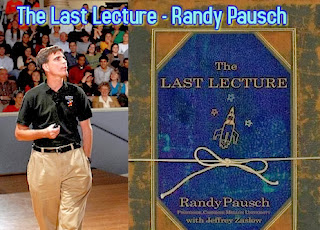What Can We Learn About Teaching and Learning From Randy Pausch?
After viewing Randy Pausch's Last Lecture: Achieving Your Childhood Dreams, I learned about the teaching methods Randy Pausch advocated and used at Carnegie-Mellon University. Dr. Pausch's lecture was about everything he had learned in his life - his legacy. Dr. Pausch's advice was to live in the present, overcome obstacles, and achieve your dreams as well as enable the dreams of others.
In his lecture, Dr. Pausch said, "Time is all you have and you may find one day that you have less than you think." I believe that this quote can be applied to teaching. As a future teacher, I know that time is of the essence with students. If, as a teacher, you treat everyday like it is your last day to be able to teach, then you will have a successful day, everyday. Dr. Pausch makes the point that as one gets older, one may find that enabling the dreams of others is more important than their own. As a future teacher, I know that young children dream of outrageous things, but believing in your students makes all the difference. Another point that Dr. Pausch made that stood out to me was, "The brick walls are there for a reason. The brick walls are not there to keep us out. The brick walls are there to give us a chance to show how badly we want something. Because the brick walls are there to stop the people who don’t want it badly enough. They’re there to stop the other people." I believe this quote can be applied to teachers, students, and every individual as well. This quote demonstrates how life can knock you down, but you have to work hard to achieve what you want.
Unfortunately, Dr. Pausch passed away from liver cancer after giving this lecture. This lecture became an internet sensation, a best-selling book, and an international media story. From Dr. Pausch's Last Lecture, I learned many important ways of thinking as a teacher. I will use this wisdom when I have a classroom of my own.
"The key question to keep asking is, Are you spending your time on the right things? Because time is all you have." -Randy Pausch

Sarah, I really Hey enjoyed your post. I think your last sentence, the quote from Dr. Pausch about time, is one of the most important things we should all consider. He asks if we are spending time on the right things because time is all we have and we may have less than we think. I had never thought about applying that every day in my classroom until you said to teach like it was the last day you could teach. I think this a great way to approach teaching. If we do this we will bring passion into classroom. We need to remember to be excited to be there every day because the alternative of not being able to be there is not an option we want. It is obvious that Dr Pausch loved to teach because he chose to spend his last days teaching. I am moved by his passion and everything that he said. I hope that I will use his speech as extra motivation to live everyday to the fullest, in the classroom and out, to chase my dreams and help others to achieve theirs, and most of all to never give up. Let’s all get out there and tear down some walls!
ReplyDeleteHi Sarah, very great blog post. I like how you went into discussing the time aspect of his lecture, because all we have is time and it is very important that we use it wisely. I really liked how you connected it to being a teacher; if we teach each day as our last, we will make it more enjoyable and our students will get more out of what we are teaching. Very great post! I thoroughly enjoyed it.
ReplyDeleteThoughtful.
ReplyDeleteSome additional questions: Was he more of a coach or a teacher? Did he use PBL? How were his classes different from the ones you have taken? Although you watched a lecture do you think that lectures played a significant part in his teaching? What role does fun play in learning? What did he mean by "head fake learning"? Why "raise the bar"? Did Dr. Pausch encourage self-reflection and self-evaluation?